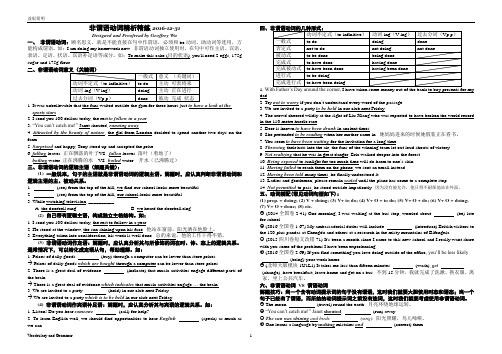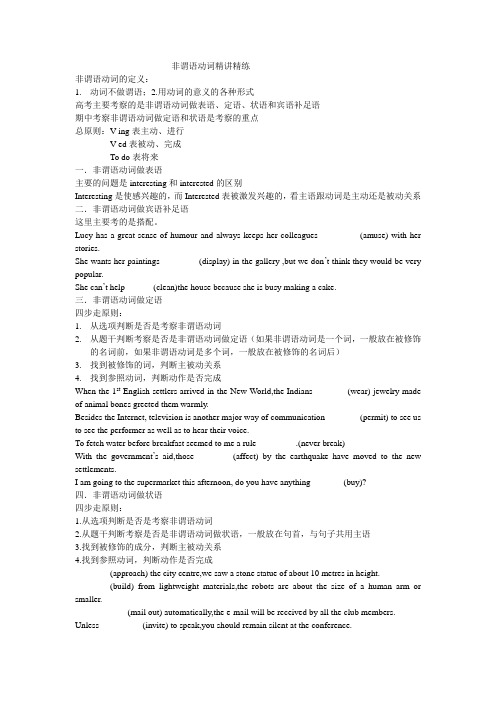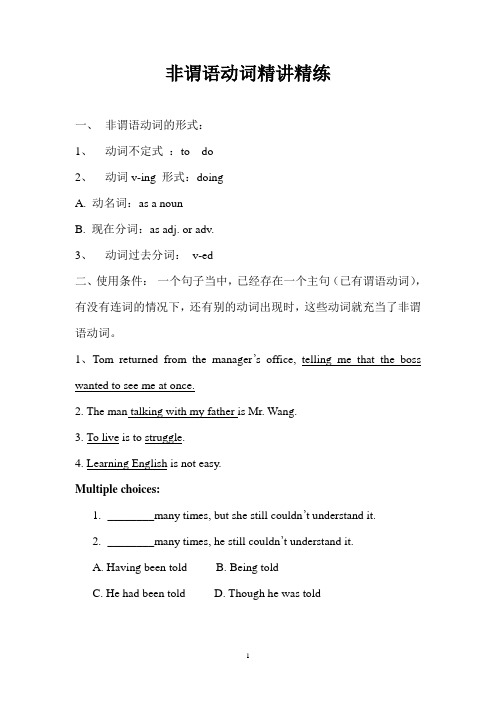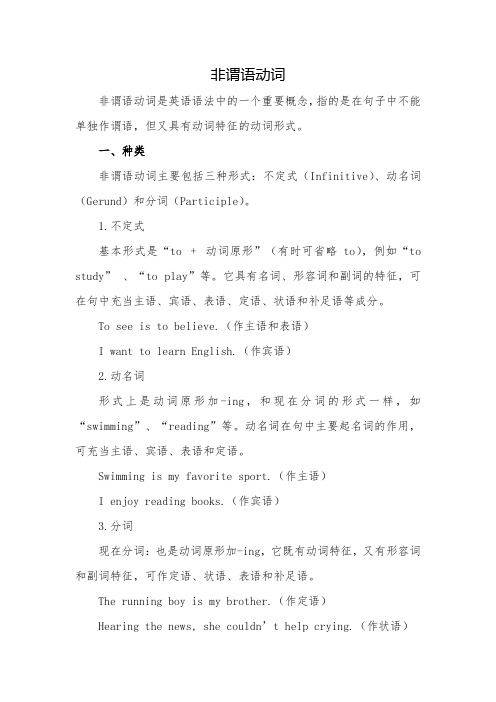非谓语动词精炼
- 格式:doc
- 大小:31.00 KB
- 文档页数:2

一、非谓语动词:顾名思义,就是不能直接在句中作谓语,必须和be动词、助动词等连用,方能构成谓语。
如:I am doing my homework now. 非谓语动词独立使用时,在句中可作主语、宾语、表语、定语、状语、宾语补足语等成分。
如:To make this cake (目的状语), you'll need 2 eggs, 175g sugar and 175g flour.1. It was unbelievable that the fans waited outside the gym for three hours just to have a look at the sports stars.2. I send you 100 dollars today, the rest to follow in a year.3. “You can’t catch me!” Janet shouted, running away.4. Attracted by the beauty of nature, the girl from London decided to spend another two days on the farm.5. Surprised and happy, Tony stood up and accepted the prize.6. falling leaves 正在飘落的叶子V S fallen leaves 落叶(着地了)boiling water 正在沸腾的水VS boiled water 开水(已沸腾过)三、非谓语动词的逻辑主语(解题关键):(1) 一般说来,句子的主语就是非谓语动词的逻辑主语。
解题时,应认真判断非谓语动词和逻辑主语的主、被动关系。
1. (see) from the top of the hill, we find our school looks more beautiful.2. (see) from the top of the hill, our school looks more beautiful.3. While watching television, __________.A. the doorbell rangB. we heard the doorbell ring(2) 自己带有逻辑主语,构成独立主格结构。

非谓语动词精讲精练非谓语动词的定义:1.动词不做谓语;2.用动词的意义的各种形式高考主要考察的是非谓语动词做表语、定语、状语和宾语补足语期中考察非谓语动词做定语和状语是考察的重点总原则:V-ing表主动、进行V-ed表被动、完成To do表将来一.非谓语动词做表语主要的问题是interesting和interested的区别Interesting是使感兴趣的,而Interested表被激发兴趣的,看主语跟动词是主动还是被动关系二.非谓语动词做宾语补足语这里主要考的是搭配。
Lucy has a great sense of humour and always keeps her colleagues _________(amuse) with her stories.She wants her paintings_________(display) in the gallery ,but we don’t think they would be very popular.She can’t help ______(clean)the house because she is busy making a cake.三.非谓语动词做定语四步走原则:1.从选项判断是否是考察非谓语动词2.从题干判断考察是否是非谓语动词做定语(如果非谓语动词是一个词,一般放在被修饰的名词前,如果非谓语动词是多个词,一般放在被修饰的名词后)3.找到被修饰的词,判断主被动关系4.找到参照动词,判断动作是否完成When the 1st English settlers arrived in the New World,the Indians________(wear) jewelry made of animal bones greeted them warmly.Besides the Internet, television is another major way of communication________(permit) to see us to see the performer as well as to hear their voice.To fetch water before breakfast seemed to me a rule_________.(never break)With the government’s aid,those ________(affect) by the earthquake have moved to the new settlements.I am going to the supermarket this afternoon, do you have anything _______(buy)?四.非谓语动词做状语四步走原则:1.从选项判断是否是考察非谓语动词2.从题干判断考察是否是非谓语动词做状语,一般放在句首,与句子共用主语3.找到被修饰的成分,判断主被动关系4.找到参照动词,判断动作是否完成________(approach) the city centre,we saw a stone statue of about 10 metres in height.________(build) from lightweight materials,the robots are about the size of a human arm or smaller.____________(mail out) automatically,the e-mail will be received by all the club members. Unless__________(invite) to speak,you should remain silent at the conference.Having been attacked by terrorists,_________________.A.doctors came to their rescueB.the tall building collapsedC.an emergency measure was takenD.warning were given to tourists.In order to make our city green,______________.A.it is necessary to have planted more treesB.many more trees need to plantC.our city needs more treesD.we must plant more trees。

非谓语动词考点精练I. 选择填空()1. Hearing the good news, we can’t help ______.A. laughingB. to laughC. laughedD. laugh()2.I haven’t got a chair ______. Will you make room for me?A. to sitB. to sit inC. for sittingD. sitting on()3. It was so cold that the travelers had the fire ______ all the night.A. burningB. to burnC. burnD. burnt()4.It’s time for Meimei and ______to the Palace Museum.A.I goingB.I to goC. me goingD. me to go()5. His father told him ______ play computer games.A. notB. don’tC. not toD. to not()6. The parents make their son ______the room every morning.A. to tidyB. tidyingC. tidiedD. tidy()7. You look tired. You’d better______ to bed earlier.A. to goB. goC. wentD. going()8. The scientist stopped ______ to me though he was busy.A. talkingB. to talkC. to have talkD. having talk()9. It’s very kind ______ you to help me.A. withB. ofC. forD. off()10. I have no pen ______.A. to writeB. to write onC. to write withD. for write()11. —Would you like to attend my birthday party, Lucy?—____________.A. Oh, thanks. I’d love to.B. Oh, thank you very much. I’m glad.C. Yes, I do. It’s a pleasure.D. Not at all.()12.Some people were reading in the library. Miss Yang asked me______ loudly there.A .speak B. don't speak C. not speak D .not to speak()13 .How did you make the child______ while he was crying?A. smileB. to smileC. smilesD. smiled()14.Would you mind my ______ the window?A. openingB. openC. to openD. opened()15.Don't let the little boy ______in the river.A. swimB. swimsC. swimmingD. to swim()16.I saw them ______volleyball at this time yesterday.A. playB. playedC. to playD. playing()17.Lily is often heard ______ in her bedroom.A. singB. sings C .to sing D. sang()18 .The runner fell, but he quickly got up and went on______A .running B. run C. to D. ran()19.—— Have you finished ______the book?—— Not yet. I'll try______ it to you before Friday.A . reading, returning B. to read, to return C. reading, to return D. to read, returning()20.Many people watched the boys______ the mountain at that time.A .climb B. climbing C. to climb D. climbed()21. Lucy and Lily enjoy ______ in China.A . live B. lives C .to live D .living()22.I like______, but I don't like ______right now.A .singing; to singB .to sing; singC .singing; singingD .to sing; to sing()23.You'd better ______ him about that.A .don't tellB .not tellC .to not tellD .not to tell()24 .It's time to ______ school.A .goB .getC .go toD .have()25.Parents should _____their children ______smoking.A .stop, for B. stop, from C. ask; to D .ask, from()26.The baby stopped ______ as soon as she saw her mother.A . to cry B. crying C .cried D .cries()27.—What shall we do this Sunday?—Why ______to West Hill Farm?— Good idea.A . don't goB .you not goC .not goD .not to go()28.Everybody is busy______ ready for Christmas and buying Christmas presents.A .getB .gettingC .to getD .got()29.He ran into the room ______the girl.A .savingB .to saveC .savesD .saved()30.—Did the teacher tell you ______this afternoon?—Yes. We'll go to visit the Science Museum.A .to whereB .how to doC .what to doD .to do what()31.—________we go at 7:30?—What about______ it a little earlier?A .Shall, making B. Shall, to make C. Will, making D. Will, to make ()32.—— Did you hear her______ this song?—— Sometimes.A .singB .sangC .singing D. to sing()33. I'm sorry I've kept you _____for so long.A .waitB .waitingC .workD .to work()34.I decided ______late again.A .to be not B. to not be C .don't be D .not to be()35.Will you please______ with me tomorrow?A .go to see the filmB .to go to the cinemaC .go to cinemaD .to go to see the film()36.Remember______ your seat to an older person on the bus.A .to give B. give C .giving D. gives()37.The teacher told us not ______ in the sun .A. readB. to readC. readsD. reading)38. My watch doesn’t work. I must have it ______.A. repairedB. repairsC.repairD.repairing()39. Stop ______ so much noise! My father is sleeping.A. to makeB. makingC. to hearD. hearing()40. wo are now short ____ fresh water. Something must be done to stop people _____ polluting it.A. for, toB. for, fromC. of, toD. of, from()41. The little girl saw the monkey in the park______ with a toy bear.A. to playB. playingC. is playingD. plays()42. Tomorrow’s meeting is very important. Please ask them______ there on time.A. goB. goingC. to goD. went()43. Do you enjoy ______ English in our class, Mr. Green?A. teachB. taughtC. to teachD. teaching()44. That day I saw some parents ______ at the back of the classroom,______ to the teacher.A. sitting,listenedB. sat,listenedC. sitting, listeningD. sat,listening )45.—Did you have anyone ______ the trees?—Yes,I had the trees ______.A. to water,waterB. to water,wateredC. water,to be wateredD. water,watered()46.—Do you still remember ______ me somewhere in Shanghai?—Yes,of course. Two years ago.A. to seeB. seeC. seeingD. saw()47 .The young lady watched her daughter ______a yo-yo yesterdayafternoon.A. to play withB. playing withC. to playD. plays ()48.No matter how hard it is, we’ll keep ______ until we make it.A. failedB. failingC. triedD. trying()49.I have finished ______this book. You can take it away.A. to readB. readC. readingD. reads()50.I hear someone ______at the door. Please go and see who ______ is.A. knock, itB. knocking,. itC. knocking, heD. knock, he()51.He is too old ______the box.A. to carry B .carrying C. carry D. carries ()52.—I saw Betty go to Grandpa Zhang’s home just now.—Yes, she is often seen ______ the old man with his housework.A. helpB. to helpC. helpsD. helped)53.—Could you give me a hand, please ?—Sure. What would you like me______?A. doB. to doC. doingD. does()54.I’ll be sorry ______ Kunming . I’ve enjoyed living here.A. to leaveB. to live inC. to stay inD. visit()55.He often asks his son ______his clothes.A. to washB. washC. washingD. washed ()56.Some boys of Class One enjoy ______ music.A. listen toB. listens toC. listening toD. listened to()57.They decided ______ on the field trip because of the rain.A. to goB. no goingC. not to goD. going()58.Aunt Li often ask her son ______ too much meat. It’s bad for his health.A. don’t eatB. not to eatC. not eatD. to not eat ()59.Sorry for I can't go. Because I have so many things ______ .A. doneB. to doC. doingD. to be done()60.I'm old and I have no chance _______the army.A. joinB. to joinC. joinedD. joining()61.—Shopping with me?—Sorry. I have a lot of clothes______.A. to washB. washedC. washD. to be washed ()62.The policeman told the little boy ______ football in the street. It’s dangerous .A. not playB. not playingC. not to playD. to play()63.We have two rooms ______, but I can’t decide______.A. to live, to choose which oneB. lived , choose which oneC. to live in, which one to chooseD. live , which one()64.He raised his voice to make everybody in the room ______ him clearly.A. heardB. hearC. to hearD. hearing()65.I wonder ______it is worth______.A. that, readingB. if, readingC. that, to readD. whether, to read()66.—What are you doing alone?—I’m busy ______ my lessons.A. reviewB. haveC. doD. reviewing()67.It is bad for your eyes ______ computer games too much.A. playsB. to playC. playD. to playing()68.It takes him twenty minutes ______ to school.A. to walkB. walkingC. walksD. walk ()69. We must plant more trees to stop the sand from ______ towards the rich farmland.A. moveB. to moveC. movedD. moving()70.—Would you mind ______ my pet dog while I’m away?—Sure, no problem.A. setting upB. looking afterC. turning downD. keeping out()71.I know she prefers______ to ______.A. skate, swimB. skating, swimmingC. to skate, swimmingD. to skate, to swim()72.—Do you feel like ______ or shall we go by bus?—I prefer to walk, but we have _____a taxi, for time is short.A. walking; to takeB. to walk; takeC. walking; takenD. to walk; took()73.When I looked into the room I found Philip himself ______in bed.A. liesB. lieC. layD. lying()74.Internet bars mustn’t let people under 18 in or let anybody ______ bad things.A. watchB. to watchC. watchingD. watches ()75.They preferred ______in bed rather than ______ horses.A. to lie, to rideB. lying; ridingC. to lie, rideD. lying, ride()76.Because there was little time, they agree ______ at once.A. with leaveB. to leaveC. leftD. leaving()77.We needn't ______ there again for the work has finishedA. goingB. to goC. goD. gone)78. She spent half an hour ______ her homework.A. finishing to doB. to finish doingC. finishing doingD. finish todo()79.Students are often asked ______ loudly in the library. They must keep quiet.A. don’t speakB. not to speakC. not speakD. speak()80.It’s difficult ______ a job.A. to find outB. to findC. to look forD. look forII.用所给动词的适当形式填空81. Don't you think it is worth ______ this question? (discuss)82. The guests are waiting for you in the ______ room. (live)83. I will have a new house ______ next year. (build)84. Noodles are my favorite. But I don't like ______ (eat) them when I feel sick.85.Mr. King is usually seen ______ (go) shopping with his wife.86.—To finish the work in time, we must stop______ (have) a rest.—All right, stop______ (dig) the holes.87. Mr. Green forgot ______his umbrella so he didn't take it back home. (bring)88. The broken bike needs ______at once. (repair)89. For example, a man ______ (call) Zhou Hua puts his family name Zhou first.90. There are three girls ______ (look) after those foreigners.91. He promised ______(send)me the bill as soon as possible .92. Soon he gave up ______(teach)and joined the army .93. She couldn’t help ______(smile)at the words .94. We must try ______(get)anything done in time .95. I regret ______(tell)you that you failed in the exam .96. Jack regrets ______(not see)the film last night .97. They refused ______(pay)the taxes .98. John pretended ______(sleep)when his wife came back .99. Stop ______(talk). It’s time for class .100. Please remember______(post)the letter when you pass by the post office . 101. My favorite water sport is ______. (swim)102. I shall never forget ______the popular singer at the concert. (see)103. I've never eaten this kind of food before, let me try ______.(eat)104. All of us must make a contribution to _____ the animals. (protect )105. We always desire ______(live)in peace with our neighbors .106. I was pleased ______(meet)your sister the week before last .107. He is said ______(be)an excellent singer in his youth .108. It’s no use ______(ask)him about it .109. In her spare time she enjoys ______(read)novels or goes ______(camp). 110. He never missed ______(attend)my lectures .参考答案非谓语动词1-5 ABADC 6-10 DBBBC 11-15 ADAAA 16-20 DCACB 21-25 DABCB 26-30 BCBBC 31-35AABDA 36-40ABABB 41-45BCDCD 46-50CBDCB 51-55ABBAA 56-60CCBBB 61-65ACCBB 66-70DBADB 71-75BADAC 76-80BBCBC 81.discussing 82.living 83.built 84.to eat 85.to go 86.to have 87bringing 88.to be repaired 89.called 90.looking 91.to send 92.teaching 93.smiling 94. to get 95.to tell 96. not to see 97. to pay 98. to sleep 99.talking 100. to post 101. swimming 102.to see 103.eating 104.protecting 105. to live 106. to meet 107. to be 108. to ask 109. reading ,camping 110. to attend。

非谓语动词精讲精练一、非谓语动词的形式:1、动词不定式:to do2、动词v-ing 形式:doingA. 动名词:as a nounB. 现在分词:as adj. or adv.3、动词过去分词:v-ed二、使用条件:一个句子当中,已经存在一个主句(已有谓语动词),有没有连词的情况下,还有别的动词出现时,这些动词就充当了非谓语动词。
1、Tom returned from the manager’s office, telling me that the boss wanted to see me at once.2. The man talking with my father is Mr. Wang.3. To live is to struggle.4. Learning English is not easy.Multiple choices:1.________many times, but she still couldn’t understand it.2.________many times, he still couldn’t understand it.A. Having been toldB. Being toldC. He had been toldD. Though he was told3.It ______ a hot day, we’d better go swimming.4._______a rainy day; we decided not to go there.A. isB. to beC. beingD. It beingE. It wasF. been三、非谓语动词的句法作用。
Exercises:区分以下的非谓语动词形式;1.Running is good for our health.2.I saw him drawing in the classroom.3.I went to see my grandfather last night.4.She can’t help laughing.四、非谓语动词的解题技巧:下面从两个方面来复习非谓语动词:(一)、七大原则原则一:用作目的状语,一般用动词不定式:to do原则二:用作伴随状语,一般用现在分词:doing原则三:原作结果状语,可用to do \doing原则四:凡是含有被动意义时,原则上用过去分词原则五:非谓语动词作状语时,其逻辑主语应与主句主语相一致。

中考英语一轮复习—非谓语动词考点聚焦精讲及训练(含解析)不充当句子谓语的动词叫做非谓语动词。
它们不受主语限制,无时态与语态变化,又称非限定性动词。
非谓语动词包括动词不定式、动名词和分词三种形式;其中分词又包含现在分词和过去分词两种形式。
1、动词不定式动词不定式的基本形式为:“to+动词原形”,有些动词可以不用to,这里的to为不定式符号,本身无词义;不定式没有人称和数的变化,在句中不能作谓语,但能保持动词的特点。
动词不定式可作主语、表语、宾语、定语、状语和宾语补足语,初中阶段应该掌握的是不定式作宾语、宾语补足语及目的状语的用法。
(1)动词不定式作主语动词不定式作主语时,常用it作形式主语,而将真正的主语置于句末,这样可使主语不至显得太长,避免头重脚轻的现象。
动词不定式作主语的基本结构是:It+be+形容词(+for/of sb)+to do sth..To learn English well is not easy.=It is not easy to learn English well.学好英语不容易。
1.It’s easy(for me)to do that.我做这事太容易了。
2.It’s difficult for Jim to learn Chinese well.对于吉姆来说学好中文是困难的。
3.It’s important for us to protect the environment.保护环境对于我们来说是重要的。
1.It’s very kind of him to help us.他帮助我们,他真好。
2.It’s very nice of you to help me.你来帮助我,你真是太好了。
1.It’s our duty to take good care of the old.2.It took me half an hour to walk there.我走到那儿花了半小时的时间。

非谓语动词非谓语动词是英语语法中的一个重要概念,指的是在句子中不能单独作谓语,但又具有动词特征的动词形式。
一、种类非谓语动词主要包括三种形式:不定式(Infinitive)、动名词(Gerund)和分词(Participle)。
1.不定式基本形式是“to + 动词原形”(有时可省略to),例如“to study”、“to play”等。
它具有名词、形容词和副词的特征,可在句中充当主语、宾语、表语、定语、状语和补足语等成分。
To see is to believe.(作主语和表语)I want to learn English.(作宾语)2.动名词形式上是动词原形加-ing,和现在分词的形式一样,如“swimming”、“reading”等。
动名词在句中主要起名词的作用,可充当主语、宾语、表语和定语。
Swimming is my favorite sport.(作主语)I enjoy reading books.(作宾语)3.分词现在分词:也是动词原形加-ing,它既有动词特征,又有形容词和副词特征,可作定语、状语、表语和补足语。
The running boy is my brother.(作定语)Hearing the news, she couldn’t help crying.(作状语)过去分词:通常是动词原形加-ed(规则变化)或有其特殊的不规则变化形式,如“broken”、“written”等。
过去分词常表示被动或完成的意义,同样能充当定语、状语、表语和补足语等成分。
The broken cup is on the table.(作定语)Given more time, I can do it better.(作状语)二、用法区别1.作主语时不定式作主语常表示具体的某一次动作或行为,常用“It + be + 形容词+ (for/of sb.) + to do sth.”这样的结构,It is important for us to learn English well.动名词作主语往往表示抽象的、一般性的行为或概念。
非谓语动词精练100题(付答案)-非谓语动词Doing 为非谓语动词,由do +ing 构成,充当1.主语2. 宾语3.表语4. 定语5.状语6.宾语补足语,起名词、形容词、副词作用。
Doing 表示主动、进行Done 表示被动、完成1.Doing 作主语Doing …. + V + OIn many countries, shaking heads means “no” and nodding heads means “yes”.2作宾语(动词宾语和介词宾语)He finished reading the bookyesterday.I enjoy learning English. (动词宾语)I am fond of watching TV.(介词宾语)以下动词须用doing 做宾语enjoy, finish, suggest, appreciate, practice,try, risk, consider, miss, mind, delay, avoid, + doing特殊用法ing表被动:need, require, want + doing= need to be done give up, can’t help, look forward, have trouble +doing3.作表语The story is amusing.The news is exciting .The situation is encouraging.比较doing & doneThe children are amused.People are excited by the news。
The boy is encouraged by the words.4.作定语a. the laughing audience / an amusing storyThe amusing play = the play that is amusing.The girl singing on the stage = The girl whois singing on the stage.a flying kite - a kite which is flying 放飞的风筝the rising sun –the sun that is rising 在升起的太阳the dancing girl - the girl who is dancing 在跳舞女孩the coming week –the week that is coming 下周注:doing sth 作定语相当于定语从句,表主动进行。
非谓语动词知识点梳理及经典练习(超详细)含答案解析一、非谓语动词1.—I didn't hear you come in just now.—That's good. I tried______the baby up.A. to wakeB. not to wakeC. waking【答案】 B【解析】【分析】——刚才我没有听见你进来。
——还不错.我尽量不吵醒婴儿。
try to dosth尽力做某事,否定形式在to前面加not.故选B.【点评】考查动词不定式的否定式。
2.I like the TV program The Reader best. I think we should spend as much time as we can inour spare time.A. readB. to readC. readingD. reads【答案】 B【解析】【分析】句意:我最喜欢电视节目《朗读者》。
我认为在业余时间,我们应该尽可能多的花费时间读书。
读书是花费时间的目的,在句中做状语,应使用动词不定式,spend time doing sth,表示花钱或时间做了某事,强调做了,根据should,可知事情还没做,因此不能选C,故答案是B。
【点评】考查非谓语动词——动词不定式,注意做目的状语一般应使用动词不定式,同时注意不要受到spend…doing固定搭配的影响。
3.Nowadays,most people prefer to________ computer games rather than ___________ books.A. play;readingB. play;readC. playing; reading【答案】 B【解析】【分析】句意:现在,大部分人比起读书更喜欢玩电脑游戏。
prefer to doA rather than do B比起B更喜欢做A。
故答案为B。
胆置黑词考,牖讲含蜜g)讲义非谓语动词是高考语法填空和短文改错必考热点语法工程之一。
现结合典型考题对非谓语动词的考点进行梳理和总结,帮助大家明确考点,找出解题规律和方法。
一、考查非谓语动词作主语能作主语的非谓语动词有不定式和动名词。
两者的区别是:表示某一具体的动作时、多用不定式;表示比拟抽象的一般的行为倾向时,多用动名词。
当动名词或不定式短语较长时,常用it作形式主语放在句首而把动名词或不定式短语放于句末。
(典例】(ignore) the difference between the two research findings will be one of the worst mistakes you make.解析:Ignoring。
分析句子结构可知,本句的谓语动词是will be,因此前面局部是主语,应该使用动名词短语作主语。
二、考查非谓语动词作宾语不定式和动名词都可作动词或介词的宾语。
有些动词后只跟不定式作宾语,如want, wish, hope, manage, demand, promise, refuse, pretend, plan, offer, decide, agree, expect等。
有些动词后只跟动名词作宾语,如admit, appreciate, avoid, consider, delay, dislike, enjoy, escape, excuse, finish, forgive, imagine, keep, mind, miss, practice, resist, risk, suggest, deny, stand 等。
有些动词或动词短语后既可以跟不定式,又可以跟动名词作宾语,如forget, remember, regret, mean, try, go on等,但意义上有区别。
[典例1 ] I showed them I was independent by wear strange clothes.解析:wear改为wearing”介词by后应接动名词作宾语。
1.__ their hats into the air, the fans of the winning team let out loud shouts ofvictory.A.To throwB. ThrownC. ThrowingD. Being thrown2.–What’s the matter with you?--__the window, my finger was cut unexpectedly.A. CleaningB. To cleanC. While cleaningD. While I was cleaning3. __ to hospital in time, the wounded soldiers were saved at last.A. TakenB. TakingC. Having takenD. Being taken4. __ in 1636, Harvard is one of the most famous universities in the United States.A. Being foundB.It was foundedC. FoundedD. Founding5. __not to miss the flight at 15:20, the manager set out for the airport in a hurry.A. RemindingB. RemindedC. To remindD. Having reminded6. ___time and labor, cartoonists generally draw the hands of their characters with only 3 fingers and a thumb. A. To save B. Saving C. Saved D Having saved7. If there’s a lot of work ___, I am happy to just keep on until it is finished.A. to doB. to be doingC. doneD. doing8. We are invited to a party __ in our club next Friday.A. to be heldB. heldC. being heldD. holding9. __ horrible, the medicine was thrown away by the child.A. TastedB. TastingC. To tasteD. Being tasted10. __ dirty, the classroom needs ___.A. Being looked; cleaningB. Looking; cleaningC.Looked; cleaningD. Looking; cleaned11. The flowers __ sweet in the garden attract many visitors.A. Being smelledB. SmellingC. To smellD. Smelled12. __ with a difficult situation, he decided to ask his boss for advice.A. To faceB. Having facedC. FacedD. Facing13. __ in a white uniform, he looks more like a cook than a doctor.A. DressedB. To dressC. DressingD. Having dressed14. The old man, __ abroad for twenty years, is on the way back to his motherland.A. to workB. workingC. to have workedD. having worked15. __ in the queue for half an hour, Tom suddenly realized that he had left his wallet at home.A. To waitB. Have waitedC. Having waitedD. To have waited16. I hear they’ve promoted Tom, but he didn’t mention __ when we talked on the phone.A. to promoteB. having been promotedC. having promotedD. to be promoted17. __ that he was in great danger, Eric walked deeper into the forest.A. Not realizedB. Not to realizeC. Not realizingD. Not to have realized18. __ the programme, they have to stay there for another two weeks.A. Not completingB. Not completedC. Not having completedD. Having not completed19. __ information about children’s health is his job.A. To collectB. CollectC. CollectingD. Being collect20. __ made the student __ interest in his study.A. Being punished;to loseB. Punished;loseC. Being punished;loseD. Having been punished; lost21. His parents died, __ him an orphan.A. to leaveB. having leftC. leavingD. to have left22. He hurried to the station only __the train had left.A.to findB.findingC.foundD.to have found23. He was busy writing a story, only __ once in a while to smoke a cigarette.A. to stopB. stoppingC. to have stoppedD. having stopped24. European football is played in 80 countries, __ it the most popular sport in the world.A. makingB. makesC. madeD. to make25. They ended the discussion with no agreement reach .26. With so many clothes wash , I won’t be able to go out.27. The murder was taken in with his hands ___.A. being tiedB. having tiedC. to be tiedD. tied28. John received an invitation to dinner, and with his work __, he gladly accepted it.29. Every evening after dinner, if not __ from work, I will spend some time walking my dog.A. being tired b. tiring C. tired D. to be tired30. The flowers his friend gave him will die unless __ every day.A. wateredB. wateringC. waterD. to water31. Though __ money ,his parents managed to send him to university.A. lackedB. lacking ofC. lackingD. lacked in32. With the world changing fast, we have something new __ with all by ourselves every day.A. dealB. dealtC. to dealD. dealing33. The director had her assistant __ some hot dogs for the meeting.A. picked uaB. picks upC. pick up d. picking up34. Jenny hopes that Mr.Smith will suggest a good way to have her written English _ in a short period. A. improved B. improving C. to improve D. improve 35. __ and short of breath, Andy and Ruby were the first to reach the top of Mount Tai.A. To be tiredB. TiredC.TiringD. Being tired36. When we visited my old family home, memory came __ back.\A. floodingB. to floodC. floodD. flooded37. It is often __ that human beings are naturally equipped to speak.A. saidB. to sayC. sayingD. being said38. – The last one __ pays the meal. – Agreed!A. arrivedB.arriveC. to arriveD. arriving。